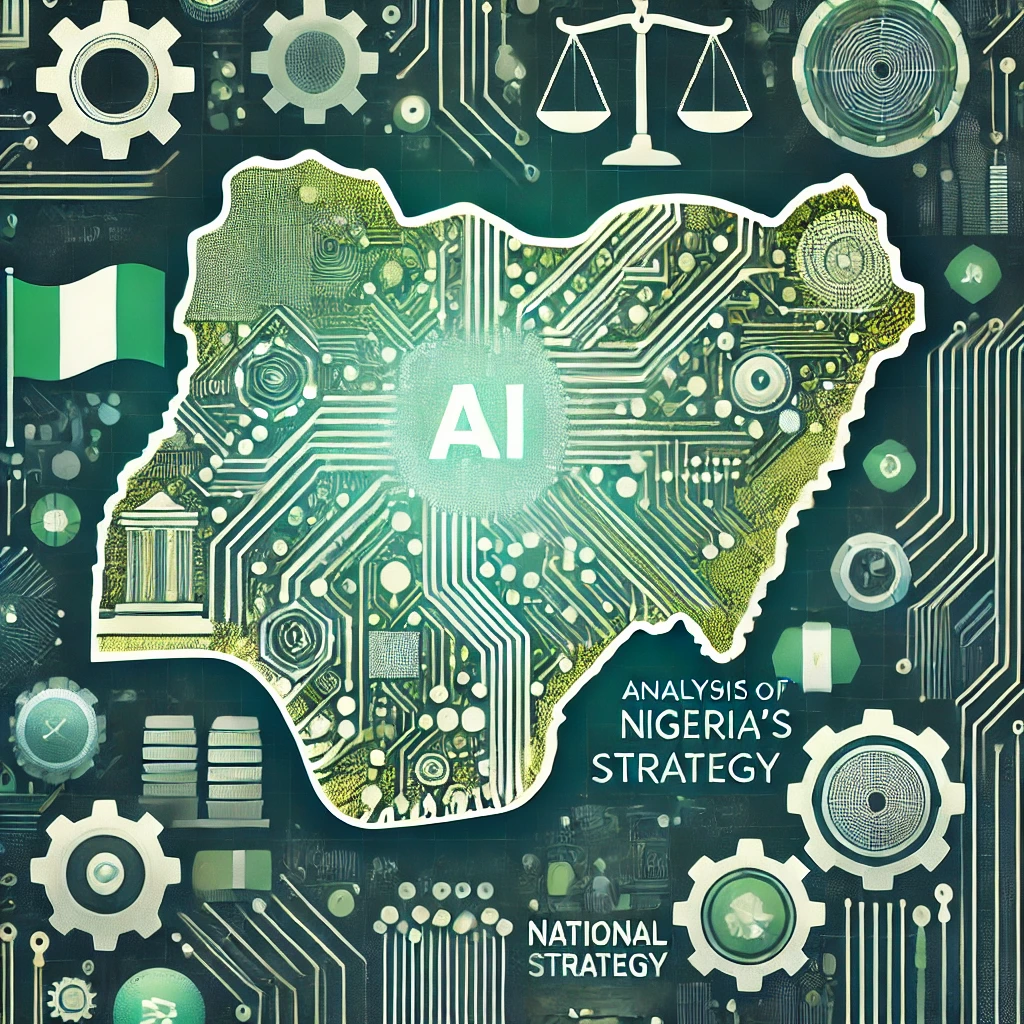In recent years, Nigeria has decisively shifted the conversation around Artificial Intelligence from idle speculation to active implementation. What once was a page in policy documents is now becoming visible in real sectors—healthcare, agriculture, finance, and logistics. The central question is no longer “Can we?” but “How fast and how well?”
With a large, youthful population, rising digital adoption, and increasing policy focus, Nigeria is poised at an inflexion point. But success will depend less on lofty plans and more on execution: closing infrastructure gaps, strengthening governance, and making sure AI innovation benefits all Nigerians—not just a few tech hubs.
Table of Contents

Strategy as a Starting Point: Laying the National Blueprint
Crafting a national AI policy was never meant to be the finish line. Rather, it functions as the scaffolding upon which Nigeria can build real-world systems and solutions. Recognising AI as a national priority signals that the government understands the magnitude of what’s at stake—economic growth, international competitiveness, and social inclusion.
The National AI Strategy sets out ambitious goals: fostering research, nurturing talent, and ensuring ethical oversight. It reflects the understanding that adoption must be holistic—across sectors—and sensitive to local realities. For instance, it emphasises not only models and algorithms but also infrastructure (power, broadband, cloud) and regulation (data privacy, algorithmic accountability).
International collaborators are playing their part. Microsoft, in concert with PwC and Lagos Business School, has offered a roadmap to accelerate Nigeria’s AI uptake. Their joint report draws attention to early success stories across fintech, health tech, and precision agriculture, but also to persistent challenges: gaps in skills, regulatory uncertainty, and uneven infrastructure.
One notable initiative is the Three Million Technical Talent (3MTT) programme, supported by Microsoft’s AI Skills Navigator. It seeks to build a pipeline of AI-savvy professionals nationwide, closing the gap between supply and demand for capable data scientists, engineers, and AI technicians.
Yet crafting a roadmap is only half the battle. Implementation is where many good strategies falter—whether due to lack of funding, institutional inertia, or weak collaboration across government and private sector. For Nigeria’s strategy to move from paper to practice, the next phase must be characterised by agility, course correction, and relentless focus on results.
From Blueprint to Real Impact: Successes, Challenges, and Leverage Points
Already, Nigeria’s AI journey is generating sparks of tangible change—though hurdles remain.
Where AI is making inroads
- In fintech, Nigeria’s strong mobile penetration and relatively flexible regulatory environment have allowed AI-powered credit scoring, fraud detection, and customer service solutions to thrive.
- Agriculture is seeing applications of predictive analytics, satellite imagery, and smart sensors to optimise yield, monitor pests, and guide input usage.
- In health tech, AI supports diagnostics, patient triage, and resource allocation, particularly in under-resourced or remote areas.
- Logistics and energy sectors offer fresh ground for innovation: optimising supply chains, predicting maintenance needs, and managing distributed energy resources.
These successes validate a core premise: that AI does not have to wait for “perfect conditions.” Even in constrained environments, innovation can emerge—especially when incentives align, local constraints are understood, and partnerships are forged.
Key challenges that must be addressed
- Infrastructure deficits
Chronic instability in power supply, limited broadband in rural areas, and insufficient computing infrastructure remain major obstacles. Where these deficits are often portrayed solely as impediments, they can—and perhaps should—be seen as opportunities for creative deployment models: edge computing, microgrids, off-grid AI systems. - Data governance and trust
Nigeria has already made headlines with hefty fines imposed on global tech firms for data mismanagement, underlining that governance is not optional in a digital future. Ensuring that Nigerian data is stored, managed, and used in ways that benefit local innovation, while safeguarding citizens’ rights, is vital. - Skills and human capacity
Ambitious up-skilling efforts are underway, but demand is outstripping supply. More must be done to embed AI literacy in educational curricula, reskill workers displaced by automation, and incentivise retention of top talent in Nigeria rather than brain drain. - Institutional alignment and coordination
AI is inherently cross-sectoral. Ministries, regulatory agencies, research institutions, and private firms must coordinate rather than operate in silos. Clear governance models, feedback loops, and accountability mechanisms are essential to prevent fragmentation. - Equity and inclusive impact
Without deliberate policy, AI benefits risk concentrating in urban centres or high-resource zones. Nigeria needs to ensure that smaller towns, rural areas, and underprivileged communities are not left behind. That includes ensuring affordable access, capacity building at the grassroots, and locally relevant AI solutions.
To tip from pilot to scale, Nigeria must learn fast, measure impact rigorously, and course correct where needed. Startups and government alike need to adopt an experimental mindset.

Building Bridges: How Government, Industry, and Citizens Can Collaborate
If the national AI strategy sets the direction, actual impact depends on how well different stakeholders pull together. The interplay between government, private sector, academia, and communities will largely determine outcomes.
Government’s role: steward and enabler
The state must act not only as regulator but as catalyst—offering incentives, ensuring stable energy and connectivity, and reducing bureaucratic friction. It must also be proactive in ethics, algorithmic audits, and data protection. The path ahead is through enabling frameworks, not heavy-handed control.
Industry’s role: innovation with responsibility
Tech companies—startups and global firms—must localise. That means adapting AI solutions to Nigeria’s contexts, incorporating local languages and realities, and prioritising responsible deployment. Business model innovation will matter as much as algorithmic sophistication.
Academia and research institutions: talent factories and incubators
Universities and research labs can bridge policy and practice. They should embed AI in the curriculum early, foster multidisciplinary collaboration, and act as nodes for innovation ecosystems—especially in underserved regions.
Civil society and end users: voices in the process
Communities must be involved in shaping how AI solutions affect their lives. Participatory design, clear channels for feedback, and ethical redress mechanisms can build trust and legitimacy. Citizens must grasp both the risks and opportunities—not as passive beneficiaries, but as active participants.
When all parties move together, momentum builds. Governments can de-risk investments, companies can scale responsibly, researchers can push boundaries, and citizens can hold institutions accountable.
The Road Ahead: Nigeria’s Global and Local Stakes
Nigeria’s AI moment is not just about catching up—it’s about carving out unique positioning in a rapidly transforming world. For a country with abundant natural and human capital, AI offers a chance to leapfrog legacy constraints and lead a new chapter of African technological leadership.
However, timing and resolve are critical. The global AI race is intensifying. Nations that build trust, regulation, talent, and infrastructure ahead of scale will set the standards. Nigeria must accelerate with both caution and conviction.
In the near term, priority actions should include:
- Scaling successful pilots to the national level, particularly in agriculture, health, and energy
- Dramatically expanding broadband and reliable power access, especially in underserved zones
- Establishing clear frameworks for data localisation, privacy, and algorithmic transparency
- Deepening partnership models—government, local startups, foreign firms, donor agencies
- Continuously investing in human capital, from basic AI literacy to advanced specialisation
If Nigeria gets this right, the payoff will be more than technological prestige. It could be more resilient economies, better health outcomes, more sustainable agriculture, less inequality—and a new narrative of what Nigeria can achieve.

Conclusion
In that light, this is Nigeria’s AI revolution: no longer a distant ambition but a moment unfolding now. The transition from strategy to impact will require focus, collaboration, and the courage to learn by doing. When infrastructure, governance, talent, and innovation align, Nigeria won’t just participate in the AI era—it can help define it.
Join Our Social Media Channels:
WhatsApp: NaijaEyes
Facebook: NaijaEyes
Twitter: NaijaEyes
Instagram: NaijaEyes
TikTok: NaijaEyes













![Mr Macaroni Drops Blistering Remark: ‘APC Filled with Most Corrupt People’ as He Slams Tinubu’s Controversial Pardon for Criminals=]] Mr Macaroni](https://naijaeyesblog.com/wp-content/uploads/2025/03/Mr-Macaroni-1-1-180x135.avif)

![Chaos Erupts in Abuja Hotel as BBNaija Star Phyna Sparks Fierce Scene Over Alleged N200,000 Dispute [VIDEO] Phyna](https://naijaeyesblog.com/wp-content/uploads/2024/11/A-Picture-of-Phyna-BBNaija-180x135.jpg)
























